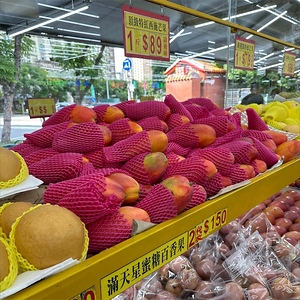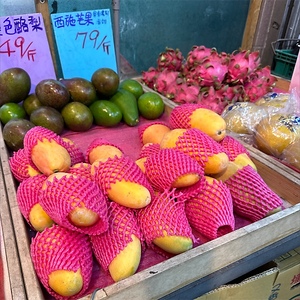


Xi Shi Mangoes
Estimated Inventory, lb : 0
Description/Taste
Xi Shi mangoes are one of the larger varietals found in Taiwanese markets, averaging 8 to 20 centimeters in length and 6.5 to 8.5 centimeters in diameter, and have an elongated, slightly tapered shape. Consumers often describe the fruit as having a water-drop-like shape with curved ends, a slender appearance, and a lightly pointed tip. Xi Shi mangoes range from 0.5 to 1.2 kilograms in weight and the skin ripens to vibrant shades of golden yellow and dark red. The skin is thin, smooth, taut, and firm, being delicate and easily scarred or bruised. As the fruit ripens, yellow lenticels and tiny black dots may appear on the surface. The skin also transitions from having a matte nature to developing an oily sheen when ripe. Underneath the surface, the golden yellow-orange flesh is dense, thick, aqueous, tender, smooth, fibreless, and succulent. Taiwanese consumers comment that the flesh has a peach-like consistency and the seed in the center of the fruit is thin, small, and flat. Xi Shi mangoes release a faint, sweet, and sugarcane-like aroma and will be slightly soft to the touch around the stem when mature. The variety is eaten ripe and has a high sugar content, around 16 to 18 degrees Brix, creating a rich, sweet, sugary, fruity, and tropical taste.
Seasons/Availability
Xi Shi mangoes are available from mid-July through August in Taiwan.
Current Facts
Xi Shi mangoes, botanically classified as Mangifera indica, are a Taiwanese variety belonging to the Anacardiaceae family. There are over 23 varieties of mangoes cultivated throughout Taiwan and Xi Shi mangoes are a late-season variety prized for their red coloring, large size, and sweet flavor. Xi Shi mangoes are a specialty mango grown in limited quantities throughout Southern Taiwan due to its challenging cultivation requirements. Each Xi Shi mango must be individually bagged by hand on the tree during production to protect the delicate-skinned fruits from pests and weather damage. Xi Shi mangoes are also a long fruit-bearing, soft-branched variety, meaning the fruits can easily fall from the branches in periods of strong winds. These cultivation requirements have restricted the number of growers desiring to produce Xi Shi mangoes, resulting in the variety to be sold at premium prices as a seasonal delicacy. Xi Shi mangoes are also known as Beiliao No. 1 mangoes, Xishi mangoes, and Xi Tzu mangoes. In Taiwanese markets, Xi Shi mangoes are often wrapped in Styrofoam and are neatly arranged in displays to highlight their elongated shape and vibrant red, auspicious coloring. The variety is favored for gift-giving, as it is larger, sweeter, and less fibrous than the commercially dominant Aiwen, also known as Irwin mango. Xi Shi mangoes are enjoyed raw and are consumed as a sweet, refreshing, and honeyed fruit.
Nutritional Value
Xi Shi mangoes have not been extensively studied for their nutritional properties. Mangoes, in general, are a source of fiber to regulate the digestive tract, vitamin C to strengthen the immune system, calcium to protect bones and teeth, and iron to develop the protein hemoglobin for oxygen transport through the bloodstream. Mangoes also provide vitamin A to maintain healthy organs, potassium to balance fluid levels within the body, magnesium to control nerve functions, phosphorus to produce genetic material such as DNA and RNA, and other nutrients, including copper, folate, B vitamins, and vitamin E. In Traditional Chinese Medicine, mangoes are believed to have cooling properties and are a natural remedy to clear heat, promote digestion, and increase qi circulation.
Applications
Xi Shi mangoes have a sweet, tropical taste suited for fresh and cooked preparations. The variety is primarily consumed out of hand to savor its soft, tender flesh and authentic flavor. Xi Shi mangoes are a premium fruit sold as a delicacy in Taiwan. The variety is popularly sliced, and the ripe flesh is eaten, discarding the skin and seed. The strongest flavor is found in the flesh just below the skin and the cultivar is favored for its fibreless texture. Xi Shi mangoes are sometimes sliced and served on fruit platters or used as a topping over tarts, cakes, ice cream, and various desserts. Mango shaved ice is a prevalent dessert served throughout Taiwan and is comprised of finely shaved ice with fresh mango juice, condensed milk, and ice cream. Depending on the establishment, some use specialty mangoes such as Xi Shi as a sliced fresh topping. It is less common to see Xi Shi mangoes in everyday mango preparations, but the variety can be used in any recipe calling for sweet, ripe mangoes. The variety can be simmered into syrups, jams, and jellies or incorporated into sticky rice, puddings, and cakes. They can also be blended into various beverages as a refreshing element. Xi Shi mangoes pair well with other fruits such as lychees, strawberries, pineapples, and papayas, vanilla, and chocolate. Whole, unopened Xi Shi mangoes should be left at room temperature in a cool and dry place to ripen. Once mature, the fruits should be immediately consumed for the best quality and flavor and can be stored for up to one week in the refrigerator.
Ethnic/Cultural Info
Xi Shi mangoes were named after famed Lady Xi Shi, one of the Four Great Beauties of China. Legend has it that Xi Shi was born in a mountain village in eastern China’s Zhejiang Province. During this time, her village was a part of the State of Yue, which was recently defeated by the State of Wu. The Emperor of Yue, Gou Jian, was captured by Fuchai, the emperor of the State of Wu, and was sentenced to manual labor for many years. After years of toil, Fuchai allowed Gou Jian to return to his home, but Gou Jian never forgot his mission to reclaim his land. Gou Jian commissioned his minister Fan Li to help a beautiful woman named Xi Shi to become a courtesan to enchant and distract Fuchai. Xi Shi spent many years honing and refining her skills, and when she was presented to Fuchai, he was immediately captivated by her beauty. It is said Xi Shi remained dedicated to the State of Yue and secretly sent intel to her kingdom while Fuchai and the State of Wu remained unaware of her dealings. Xi Shi’s strategic efforts eventually allowed Gou Jian to reclaim his stature and the State of Yue defeated the State of Wu. The legend of Xi Shi has remained one of the most retold stories throughout Chinese folklore and Xi Shi is often used as a symbol for beauty. Xi Shi mangoes were named after the woman as it is said the fruit’s delicate, smooth, and red-blushed skin embody the fair characteristics of the Chinese beauty.
Geography/History
Xi Shi mangoes are native to Taiwan and are a hybrid variety developed in Southern Taiwan. Mangoes, in general, were first planted in Taiwan through Dutch colonization in the 16th and 17th centuries, quickly naturalizing throughout the country. Several of these first naturalized introductions became known as native mangoes. Late during Japanese Colonial Rule from 1895 to 1945 CE, additional varieties were imported for mango breeding from other regions of Asia and the United States. Xi Shi mangoes were created from a cross between Guifei mangoes, a Chinese variety, and Tu mangoes, a native variety. The exact date of development is unknown, but it is thought that the variety was created sometime in the 20th century and was first grown in the Xinhua District, a municipality in Central Tainan, Taiwan. It took over seven years to cultivate and develop Xi Shi mangoes, and the variety was initially known as Beiliao No. 1 mangoes before it was rebranded as Xi Shi for increased consumer appeal. Today, Xi Shi mangoes are primarily grown in Southern Taiwan, especially in Yunling, Changhua, Tainan, Chiayi, Hualien, Pingtung, and Kaohsiung Counties. When in season, the fruits are sold throughout Taiwan and are mainly found in specialty and high-end fruit markets. Outside of Taiwan, Xi Shi mangoes are sometimes sold as a home garden mango tree through nurseries in India. The Xi Shi mangoes featured in the photograph above were sourced through Binjiang Market in Taipei, Taiwan.









